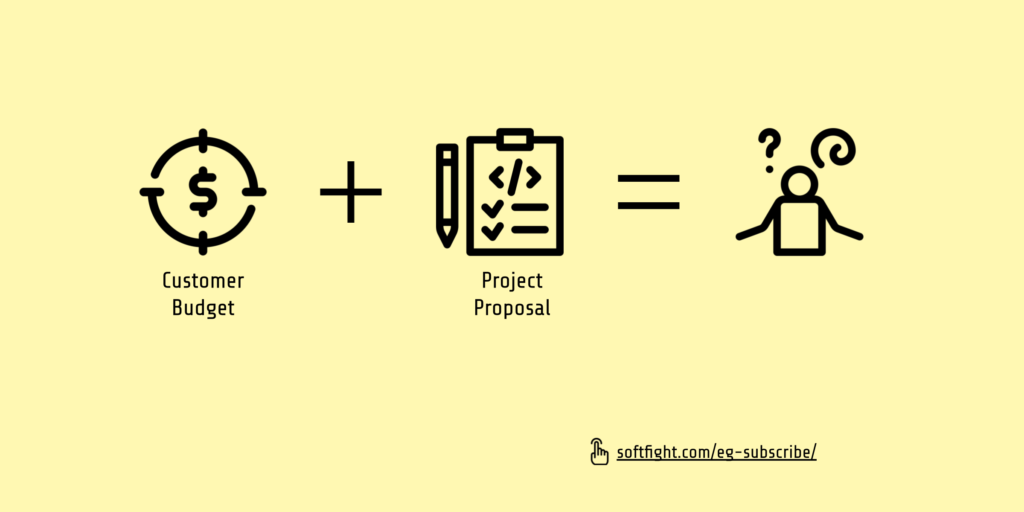It’s only natural to think that your customers for software services are always looking for the lowest prices and will choose the vendor with the lowest price.
They are not.
We humans find it rather difficult to put ourselves in someone else’s shoes. So if on Saturday we buy our groceries from the store where they are 3 or 5% cheaper, on Monday we go into the office and we automatically assume that everyone we interact with applies the same criterias in their buying process as we did at the supermarket.

Let’s take a rather simplistic example.
John is the founder of a startup in London. He’s background is in finance, he has some ideas on how to disrupt a niche area or merchant banking and he wants to build a software platform to achieve that.
He decides that the most effective way for him is to hire an external development team to build his MVP. After some extensive research, he has a shortlist of 7 different companies that he wants to talk to: some of them from Eastern Europe, some from the UK.
Also for the sake of simplification, let’s assume that he has only 3 criteria for decision: how long it will take, the quality of the result and total budget (we all know it’s a lot more complicated than that, but stay with me on this).
After detailed discussions, John receives the offers from the vendors, and they look something like this:
| Vendors | Quality(1 to 100) | Timeline (weeks) | FTE | Price, Daily Rate (EUR) | Total Budget(EUR) |
| Vendor A | 70 | 12 | 2 | 880 | 105,600 |
| Vendor B | 85 | 10 | 2 | 960 | 96,000 |
| Vendor C | 65 | 20 | 4 | 320 | 128,000 |
| Vendor D | 75 | 16 | 3 | 400 | 96,000 |
| Vendor E | 85 | 12 | 3 | 720 | 129,600 |
| Vendor F | 90 | 10 | 2 | 560 | 56,000 |
| Vendor G | 70 | 16 | 4 | 400 | 128,000 |
Which one would you work with?
Do you think John will choose the vendor offering to do the project at the lowest daily rate?
Wait, but what is the total budget?
Notice the difference between the total budget (which John cares about) and the price level (expressed in daily rates) that the vendors quoted.
What happens if the project is not delivered on time and on budget? Who pays for the overrun?
What if we introduce other factors? John knows from experience that the communication and collaboration between project contributors is critical for the success of his startup. He feels it’s necessary for him to meet in person with the team at least 2-3 days every month.
Project Management skills on the vendor side are also very important for him, as is specific domain expertise: he wants to work with a team that has worked on other finance-related projects in the past.
We could go on for a while by adding other criteria and we will easily describe a situation where John is looking at a table with at least 12-15 meaningful attributes that he has to analyze and evaluate to base his decision on.
To complicate things even more: the price value that the vendors quoted in the proposal and in the contract is not the whole price that John will be paying.
One example: John’s travel costs. He wants to meet with the team in person every month. Depending on the location of the team he chooses, the travel costs might add-up to a significant amount, which is added to the value quoted by the vendor.
The actual price paid by your customer is the sum of many things. The amount on the invoices, yes, but also the effort, risks, opportunity costs and so on.
Each vendor is quoting an (estimated) delivery time and promises a certain quality level.
What risks is John taking by accepting these promises at face value? Who has the most to lose if the vendor doesn’t deliver? Is there any difference for John if it takes 3% or 30% longer to deliver the MVP for his platform?
Some of this can be easily estimated and quantified (such as the travel costs), others not so much.
But even if the people taking the decision will not quantify and add them in an excel file, to compare like-for-like, they still play an important role in the result of the decision process.
We can complicate the picture a lot if we want to.
In our example, John is a sole founder of a startup, using his own savings to pay for developing the MVP.
What if he had 2 co-founders, a CTO and someone with experience in marketing. How would this change the decision making process and the way they will evaluate the information received from the potential vendors?
What if they are not using their own money, but are using funds raised from angel investors?
We can go in a different direction. Let’s assume that John has been running the company for 10 years, it’s highly profitable, they have developed multiple products and are now looking to expand into other markets.
So John is on the search for a software development vendor.
Do you think “lowest price I can find” is going to be a criteria on his mind while doing this search?
What if John was a senior executive in a large company, looking to add new functionality to a legacy-platform that is struggling to keep up with the newer players in the market?
What are the odds?
What is the statistical probability that a buyer that you are trying to sell to is looking for the lowest price?
In any given industry, possibly 10 to 20% of the buyers are, from a personal personality perspective, what’s called a “bargain hunter”. A low price is an important decision criteria in the way their mind works.
If you are reading this newsletter, there is a very high chance that you are not selling cheap services and you are not directly competing with the bottom-feeders of the software outsourcing world. And I bet your company website and LinkedIn profile reflect this.
Which means that the first selection has already been done: the second a buyer engages in conversation with you to talk about a potential project, they understand and accept they are not talking with a company that is claiming to be the cheapest.
So your realistic chances of talking with a bargain hunter buyer are significantly lower than the 20% applicable to the general population.
What’s more, I would go as far as to say that, even if you do meet a buyer that is a bargain hunter, you probably don’t want to sign a contract with them.
There are a few exceptions – when the client is a very large company, for example, so that person is not the only decision maker. But generally, my experience has been that bargain hunters don’t make for good clients in the long-run.
WHAT THIS MEANS FOR YOU
“Buyers in B2B are looking for the lowest prices.”
NO, they are not. You have to get this idea out of your head. Completely. Wipe it out.
Buyers are looking to pay a fair price for what they think they need.
It is your responsibility (and opportunity) as a vendor to:
- Influence the meaning of “fair price”
- To understand what the buyers think they need
- To determine if they actually need something else (sometimes this means they need less, so the price will be lower)
- And to convince them to buy from you, because you are offering what they need at a fair price

